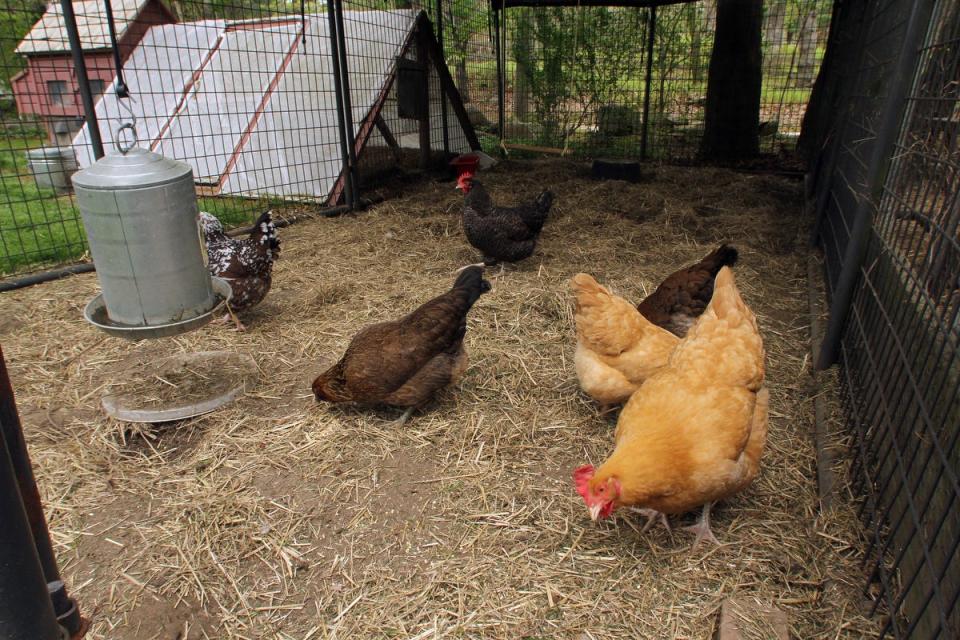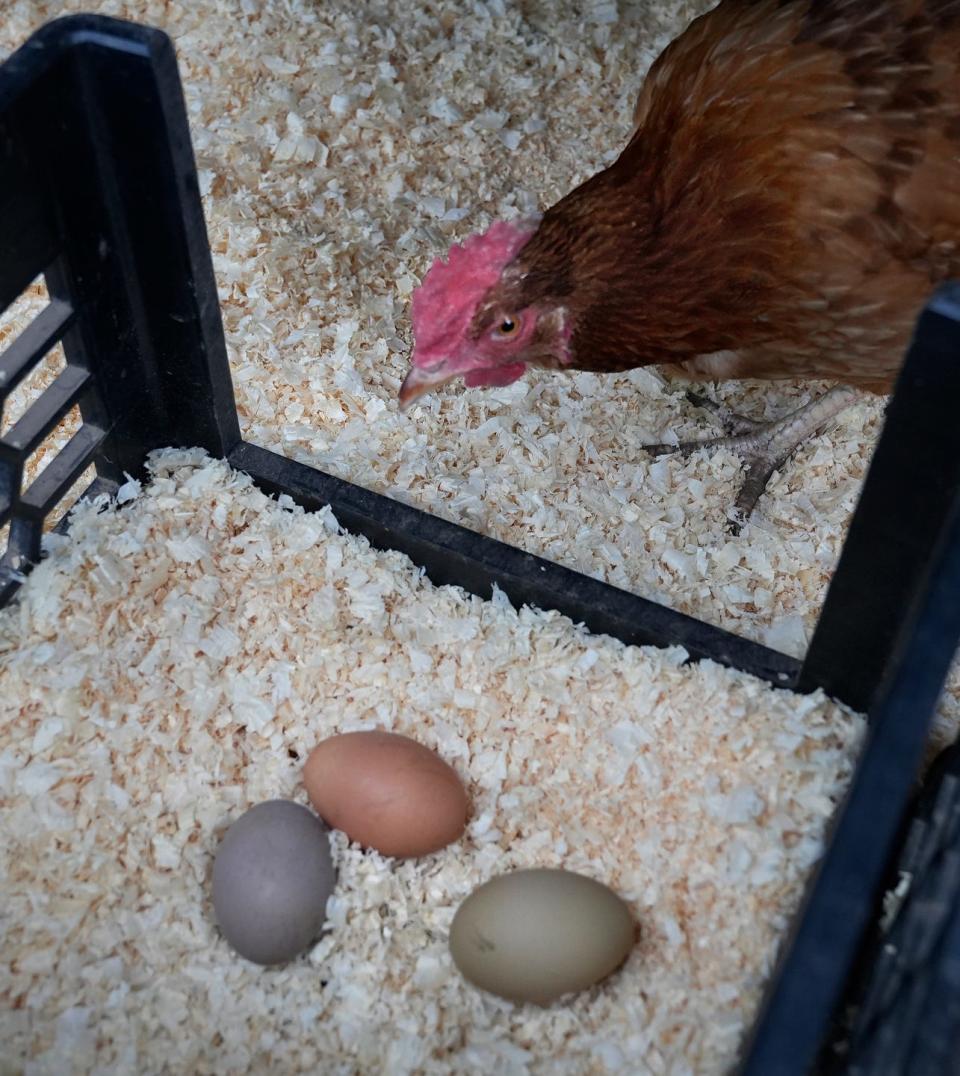Thinking about having backyard chicken in Rhode Island? Here's what you need to know
So, you think you want to start raising backyard chickens?
Maybe you started thinking about it while you stood in front of the egg case at the grocery store and couldn’t believe how much egg prices have gone up. Perhaps it happened when you had a local, freshly laid egg and realized it tasted better. Or maybe, you – like so many other people who keep backyard chickens – just really like them.
With the popularity of backyard chickens growing, The Providence Journal asked hobbyists of various experience levels for their top tips on getting started in the Ocean State. Here’s what they said.
1. Find your flock
There’s a learning curve to getting started with chickens, and while there are plenty of books, classes and articles like this one, there’s no substitute for being able to ask someone who has been in the situation you’re in. Try joining a Facebook group like “Backyard Henthusiasts of Rhode Island” to quickly connect with a lot of people who can help.
"I went to URI and was an animal-science major. I learned to the tooth how to care for a chicken," said Liz Martinelli, who has been keeping a flock since 2019. "Join as many Facebook groups as you can. When I have a question, I ask it in multiple groups."
2. Find out where in Rhode Island you can keep chickens
Rhode Island law leaves municipalities to govern who can have chickens and how many. East Providence, for example, voted down an ordinance that would have allowed people to legally keep chickens last year. Central Falls also ban chickens. Some communities like Scituate ban chickens in "the dwelling part of the house," but allow residents to keep them outside. Then there are communities like Providence, Bristol, Warren and Newport that allow for a maximum of six hens but no roosters. In more rural communities, the regulations tend to be looser.
For specifics on your community, call your city or town hall.
More on egg prices:Eggs prices making you want to shop local? Check out these RI egg farms
3. How to buy your chicks or eggs in Rhode Island
Before buying the first cute chick you see, do a bit of research on what type of birds you want for your flock and, if you live in a community that doesn't allow roosters, what sex you're buying.
Chicken buyers can choose to go with hatching eggs or with day-old chicks. Some breeders sex the chicks — an all-female group of chicks is called a pullet — and some sell them as a random assortment, which is called "straight run."
At the zoo:A baby endangered tree kangaroo is one of Roger Williams Park Zoo's newest inhabitants
Just like with other animal breeding, not all chicks and eggs come from the same quality of genetics. There are basic options available at chain stores, and then there are places like Spectrum Poultry in Glocester that breed specifically for traits such as egg color, feather pattern and temperament.
"I'm breeding toward the standard of perfection," said Jackie Zarr, owner of Spectrum Poultry. "If a chicken doesn't have a good temperament in my flock ... if a bird is going after us when we're feeding it, I won't use it in my breeding program."

The same principle holds true for egg colors, which is how she gets the range her business is named for.
4. Make sure you have the right setup for your coop
Having the right chicken coop is quite literally a life-or-death situation for your fledgling flock. Predators can strike from the air. They can dig under fences. Even chicken wire can be a bad choice, as many animals can chew through it, according to Caroline Porter, who keeps a flock of chickens and has a degree in animal science from the University of Rhode Island.
Her setup has a concrete foundation "and the coop has hardware cloth under the flooring to deter anything from digging under to get to the floorboards. Outside, the run is fortified with hardware cloth and even the screen windows have a layer for extra protection. Around the perimeter of the coop should also either have hardware cloth buried a foot down or an apron perimeter going out about three feet.”
Coops also need good ventilation and benefit from having electrical power.
5. Think about the care they'll need when they're young
In addition to establishing the setup for when they're full-grown layers, you'll also need a chick setup.
Zarr had two main pieces of advice. One, when the chicks first hatch, give them water with electrolytes — or in a pinch, some sugar in it — to help them get started. Two, it's worth the extra money for the safety benefits of a heating plate versus a heating lamp.
Wolf-dogs in RI:How RI's wolf-dog hybrid will help bring magic to Kansas veterans
6. Get ready to clean the coop to deter rats
Chicken coops are known for attracting rats. The unwanted rodents, as well as other pests, are drawn to the food, the water and the excrement.
"Rodents are extremely difficult, near impossible to not have a problem with," Porter said. "Not leaving food accessible is the best deterrent but not always possible."
That means picking up the food bins at night instead of leaving a buffet out. The other thing that can help prevent rodents is the coop setup, as all the fortifications set up to keep predators out also works against pests.
Tom Oates, of West Warwick, who has been raising chickens for 20 years, credits his coop and run design with keeping them out.
"The wire mesh goes from the roof to the ground then bends 90° out for 2 more feet. The grass grows right through it so you can’t see it," Oates said. "Pests will try to burrow right at the base and hit the mesh. They are not smart enough to back up 2 feet to start digging!"

7. Be wary of 'chicken math'
It starts with a couple of chickens, then it's a dozen, then a couple of dozen. You get the picture.
"Chicken math sounds crazy, but it's 1,000% a real thing," said Martinelli. "It can be so easy to do this that you end up with more birds than you can count."
Correction: An earlier version of this article incorrectly stated Scituate's policy on keeping chickens. Chickens are not allowed to be kept in "the dwelling part of the house."
This article originally appeared on The Providence Journal: Backyard chickens in RI: 7 tips to start raising hens for eggs

